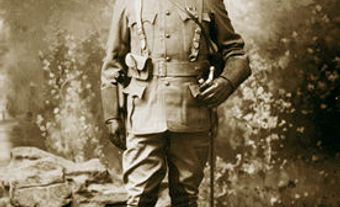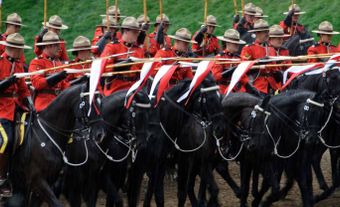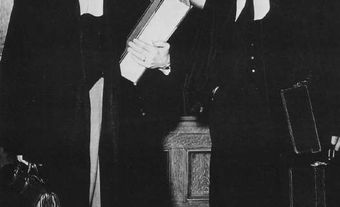Early Life and Career
Little is known of McMicken’s life before he immigrated to Chippawa, Upper Canada, in 1832. McMicken went into business as a forwarding agent for goods moving through the Niagara region, establishing contacts with some of the district’s leading businessmen. In 1835, McMicken married Ann Theresa Duff, with whom he would have seven children (including one adopted child). Ann was a granddaughter of Alexander Grant, one of the foremost figures in the early days of Upper Canada, giving McMicken a connection to a prominent family in the area.
In about 1837, McMicken moved to Queenston, where he would reside until 1851, when he moved to Clifton (now Niagara Falls, Ontario). In 1838, he was appointed collector of customs and made notary public. Over the next few years, he formed a forwarding and commissioning agency in partnership with James Hamilton, briefly operated the Niagara Suspension Bridge Bank, managed the horse-drawn Erie and Ontario Railroad, and participated in the growth of Canada’s fledgling telegraph service. His contribution to this new form of communications included patents on two telegraphic instruments.
Political and Financial Success
McMicken was elected to the municipal council of the Niagara District in 1848 and 1849. In 1850, he was elected to the new Township of Niagara, serving as reeve and as warden of the United Counties of Lincoln and Welland. During the 1850s, he was also: warden, secretary and treasurer for the builders of the Queenston-Lewiston suspension bridge; director of the Niagara District Building Society; board member of the Erie and Ontario Insurance Company; postmaster and first mayor of Clifton; and chair of Clifton’s school board. He also acted as an agent for Samuel Zimmerman, a local financier and land developer. During this period McMicken amassed a considerable personal fortune and built an imposing family house in Clifton.
The Macdonald Connection
In 1857, McMicken was elected to the Legislative Assembly of the Province of Canada as a moderate Reformer representing Welland. As a member of the Legislative Assembly (February 1858 to May 1861), he became a supporter of John A. Macdonald.
In the early 1860s, McMicken moved to Windsor, where he was president of the Bank of Western Canada (1862–64). However, by 1864, his fortunes had taken a downturn. McMicken therefore sought a salaried government appointment from Macdonald, who was then minister of Militia and attorney general for Canada West. Referring to McMicken as “a particular friend of ours,” Macdonald had him appointed excise officer for Windsor. Soon after, McMicken was also made a stipendiary magistrate and justice of the peace. Macdonald praised McMicken as “a shrewd, cool, and determined man who won’t easily lose his head and will fearlessly perform his duty.”
Head of the Western Frontier Constabulary
McMicken’s life would take an important turn in the 1860s, owing to the American Civil War, which had been raging since April 1861. The conflict had brought trouble for Canada, including American recruiters known as “crimps” crossing the border to entice Canadian civilians and British soldiers to join the Union Army. According to John Boyko, about 40,000 Canadians served with the Union army during the Civil War. However, many Canadians also sympathized with the Confederates, who established a spy network in Canada. On 19 October 1864, Confederate raiders, operating out of Canada East, struck the town of St. Albans, Vermont. They robbed three banks, killed one man and wounded another, and attempted to burn the town before escaping back across the border. The incident was greatly embarrassing to Canada and Great Britain, and created fear of American reprisals. To prevent further trouble at the border, Macdonald formed the Western Frontier Constabulary with McMicken as its head. This undercover security force has often been called Canada’s first secret service.
Spymaster
McMicken had the authority to appoint constables, pay their salaries and approve their travel expenses. Working as plainclothes detectives, about 15 men travelled the border regions. Their job was to seek out “the existence of any plot, conspiracy or organization whereby peace would be endangered, the Queen’s Majesty insulted, or her proclamation of Neutrality infringed.” They reported to McMicken twice a week, passing on information of unlawful assemblies or military drilling, or the presence of Union Army recruiting agents on Canadian soil.
McMicken himself visited American border cities to establish good relations with federal and municipal authorities. He also employed his own agents in Detroit and Buffalo. At the end of the Civil War in April 1865, McMicken dismissed many of his original band of constables.
The Fenian Threat
In the summer of 1865, Macdonald learned of the arrest of members of the Fenian Brotherhood in Ireland. The existence of numerous Fenian cells in the United States was of great concern to him. Macdonald wrote to McMicken, “The Fenian action in Ireland is serious, and the Imperial Government seems fully alive to it. We must not be caught napping. Keep me fully informed.”
On Macdonald’s orders, McMicken sent agents to infiltrate Fenian organizations in Detroit, Cincinnati and Chicago. He personally travelled to Philadelphia where, working undercover, he attended a Fenian congress and learned of a proposed plot to invade Canada. Realizing the gravity of the situation, McMicken quickly went to work upgrading his espionage network. He even proposed employing female spies to entrap Fenian leaders, but that idea does not appear to have been acted upon. McMicken also went to New York to consult with the formidable Pinkerton’s Detective Agency, which had been watching Fenian activity in the United States for a long time.
McMicken’s network gathered intelligence about several invasion plans, including the Fenian attempt to take Campobello Island in New Brunswick in April 1866. He also alerted officials in Canada West of Fenian plans to invade Fort Erie that culminated in the Battle of Ridgeway on 2 June 1866. (See also Fenian Raids.)
Dominion Police
On 7 April 1868, Thomas D’Arcy McGee, who had condemned the Fenian movement, was assassinated in Ottawa. As a direct result Macdonald (now prime minister of the new Dominion of Canada) established the Dominion Police to enforce federal laws and to guard federal buildings in the capital. McMicken immediately began to combine Dominion Police duties with his undercover operations, although he would not formally be made commissioner until December 1869.
One of his earliest and most dramatic cases, in which the Dominion Police co-operated with Pinkerton’s, was the arrest in Windsor in 1868 of notorious American outlaws Frank Reno and Charles Anderson, and their extradition to the United States under the terms of the Webster-Ashburton Treaty of 1842. The prisoners were subsequently lynched by a mob, placing a strain on US-Canadian relations. Under McMicken’s direction, the Dominion Police solved numerous crimes; and in 1870, were responsible for security during the visit to Canada of Prince Arthur, the third son of Queen Victoria and Prince Albert. McMicken was also involved in in determining the international border at sections of the St. Clair River (Treaty of Washington, 1871).
Move to Manitoba
In September 1871, McMicken was sent to Winnipeg to establish federal government offices for the new province of Manitoba. He remained commissioner of the Dominion Police, but also took on the role of Dominion land agent to deal with the controversial issue of land distribution. He was also appointed assistant receiver general and immigration agent. Before he even left Ontario, McMicken learned that Fenian agitators in the United States planned an invasion in which they hoped to be joined by discontented Métis. Louis Riel instead raised volunteers to help defend the frontier, and the invaders were captured by American forces from Fort Pembina [North Dakota], near what is now Emerson.
McMicken played a leading role in the campaign to have Winnipeg incorporated as a town, and he was instrumental in convincing Macdonald to keep it on the chosen route for the Canadian Pacific Railway instead of moving the route to pass through Selkirk. He served on the Council of Keewatin in 1876–77, and was elected to the Legislative Assembly of Manitoba in 1879. From 1880 to 1882, he was speaker for the Provincial Assembly. McMicken was also a member of the council of the University of Manitoba. In his final years, to supplement a meagre government pension, McMicken worked as an insurance agent in Winnipeg.

 Share on Facebook
Share on Facebook Share on X
Share on X Share by Email
Share by Email Share on Google Classroom
Share on Google Classroom


